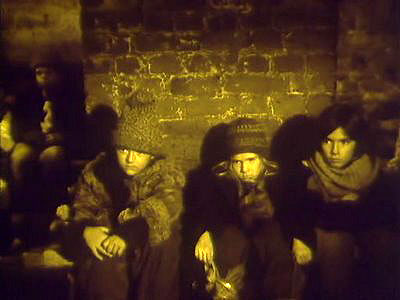Inhalte(1)
The apocalypse has arrived. The accidental launch of a missile triggers a nuclear world war. In the basement of a museum, a handful of survivors await transfer to the "main bunker". Among them is computer scientist and Nobel laureate Dr Larsen. In discussions with his dying wife and letters to his missing son, he reflects on the atomic firestorm and on the future of a humanity forced to live underground. In his excursions to a nearby church, which shelters traumatised children, and to a field hospital, the gruesome reality of a world reduced to radioactive rubble is revealed. (Berlinale)
(mehr)Kritiken (1)
This film is a product of the era of Soviet restructuring, when ideological barriers were relaxed, but there was still enough money to continue making films. Konstantin Lopushansky was a collaborator of Tarkovsky and, among other things, worked as an assistant director on the film Stalker. This artistic kinship can be traced in Dead Man's Letters. Visually, it is an immensely interesting film, with shots from the post-apocalyptic world filmed in a gloomy gray, while the flashbacks have a colored tone. It is a film with an extremely gloomy atmosphere, which, in my opinion, perfectly depicts the world after a global nuclear conflict. The surface of the planet is completely uninhabitable and desolate, and the remnants of the population survive in better or worse-equipped shelters, while the military leadership continues to issue orders to units in underground fortresses and armored transporters. People are dying by the hundreds and thousands from radiation and suffering, and those who survive lose any sense of morality in the name of survival. The main character, the scientist Larsen, sacrifices his chance for rescue in favor of a group of children whom the doctor in the main shelter did not deem worthy of saving. After the death of the old man, the oldest child takes over writing his diary, and the whole group of children sets out through the devastated landscape wearing gas masks and protective clothing in search of a new life. It is incredibly sad and incredibly emotional. Images of the devastated city still vividly come to mind even years later. An intimate, artful affair. Overall impression: 90%. Mention should be made of the depressive music by O. Messiaen and G. Faure. The infinitely more famous American The Day After doesn't even come close to Dead Man's Letters.
()

